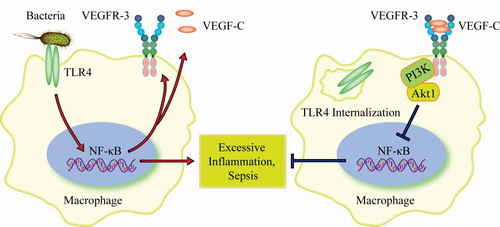
VEGFR-3 Restrains Inflammation and Protects against Endotoxin Shock
Apr 10, 2014 Email"> PrintText Size

Toll-like receptors (TLRs) are critical in mediating innate immune responses against infections. However, uncontrolled TLR-triggered inflammation is associated with endotoxin shock.
To identify new negative regulators in TLR4 signaling, Prof. WANG Hongyan’s research group at the Institute of Biochemistry and Cell Biology, Chinese Academy of Sciences, screened a group of key cytokines, chemokines, growth factors and their receptors for bacteria- or LPS-induced expression. Under the supervision of Prof. WANG Hongyan, ZHANG Yanbo and his colleagues identified that the surface Vascular Endothelial Growth Factor Receptor-3 (VEGFR-3) and its ligand VEGF-C were significantly upregulated in LPS- or Gram-negative bacteria-activated macrophages. VEGFR-3 ligation by VEGF-C significantly attenuated proinflammatory cytokine production. Notably, ablation of the ligand-binding domain or tyrosine kinase activity of VEGFR-3 rendered mice more sensitive to septic shock. VEGFR-3 restrained TLR4-NF-kB activation by regulating the PI3-kinase-Akt signaling pathway and SOCS1 expression.
WANG Hongyan’s group also observed that serum VEGF-C was greatly increased in SL1344-infected mice as well as in human sepsis patients, suggesting that VEGF-C might be used as a biomarker to diagnose sepsis. Furthermore, the inherited Vegfr3 missense mutations occur in human lymphoedema patients, who are complicated by infections. This study proposes an unrecognized role of VEGF-C therapy for lymphedema by targeting the immune system.
This work entitled “Activation of Vascular Endothelial Growth Factor Receptor-3 in Macrophages Restrains TLR4-NF-κB Signaling and Protects against Endotoxin Shock” was published online in IMMUNITY on March 21th, 2014. It was supported by grants from the Ministry of Science and Technology of China, National Natural Science Foundation of China, Shanghai Pujiang program, Instrument Developing Project of the Chinese Academy of Sciences.

Model: Bacterial infection up-regulates TLR4-NF-κB-mediated VEGFR-3 and VEGF-C expression in macrophages. VEGF-C ligation of VEGFR-3 signaling can dampen TLR4-NF-kB activation, which represents a self-control mechanism to prevent uncontrolled inflammation in macrophages during bacterial infection. (Image by Prof. WANG Hongyan’s group)
Toll-like receptors (TLRs) are critical in mediating innate immune responses against infections. However, uncontrolled TLR-triggered inflammation is associated with endotoxin shock.
To identify new negative regulators in TLR4 signaling, Prof. WANG Hongyan’s research group at the Institute of Biochemistry and Cell Biology, Chinese Academy of Sciences, screened a group of key cytokines, chemokines, growth factors and their receptors for bacteria- or LPS-induced expression. Under the supervision of Prof. WANG Hongyan, ZHANG Yanbo and his colleagues identified that the surface Vascular Endothelial Growth Factor Receptor-3 (VEGFR-3) and its ligand VEGF-C were significantly upregulated in LPS- or Gram-negative bacteria-activated macrophages. VEGFR-3 ligation by VEGF-C significantly attenuated proinflammatory cytokine production. Notably, ablation of the ligand-binding domain or tyrosine kinase activity of VEGFR-3 rendered mice more sensitive to septic shock. VEGFR-3 restrained TLR4-NF-kB activation by regulating the PI3-kinase-Akt signaling pathway and SOCS1 expression.
WANG Hongyan’s group also observed that serum VEGF-C was greatly increased in SL1344-infected mice as well as in human sepsis patients, suggesting that VEGF-C might be used as a biomarker to diagnose sepsis. Furthermore, the inherited Vegfr3 missense mutations occur in human lymphoedema patients, who are complicated by infections. This study proposes an unrecognized role of VEGF-C therapy for lymphedema by targeting the immune system.
This work entitled “Activation of Vascular Endothelial Growth Factor Receptor-3 in Macrophages Restrains TLR4-NF-κB Signaling and Protects against Endotoxin Shock” was published online in IMMUNITY on March 21th, 2014. It was supported by grants from the Ministry of Science and Technology of China, National Natural Science Foundation of China, Shanghai Pujiang program, Instrument Developing Project of the Chinese Academy of Sciences.

Model: Bacterial infection up-regulates TLR4-NF-κB-mediated VEGFR-3 and VEGF-C expression in macrophages. VEGF-C ligation of VEGFR-3 signaling can dampen TLR4-NF-kB activation, which represents a self-control mechanism to prevent uncontrolled inflammation in macrophages during bacterial infection. (Image by Prof. WANG Hongyan’s group)
CAS Institutes
There are 124 Institutions directly under the CAS by the end of 2012, with 104 research institutes, five universities & supporting organizations, 12 management organizations that consist of the headquarters and branches, and three other units. Moreover, there are 25 legal entities affiliated and 22 CAS invested holding enterprisesThere are 124 I...>> more
Contact Us

Chinese Academy of Sciences
Add: 52 Sanlihe Rd., Xicheng District, Beijing, China
Postcode: 100864
Tel: 86-10-68597592 (day) 86-10-68597289 (night)
Fax: 86-10-68511095 (day) 86-10-68512458 (night)
E-mail: cas_en@cas.cn

